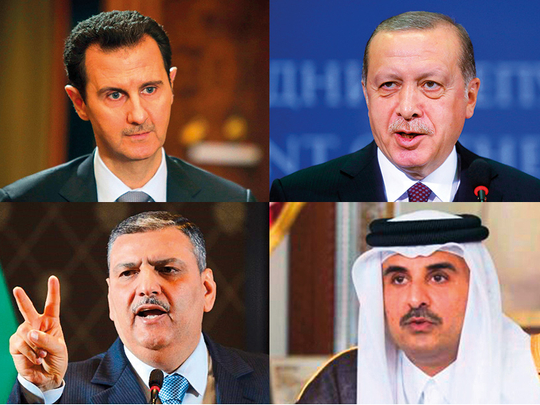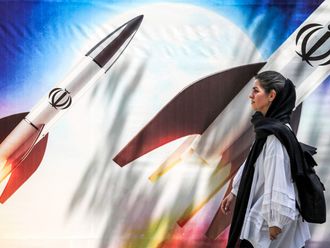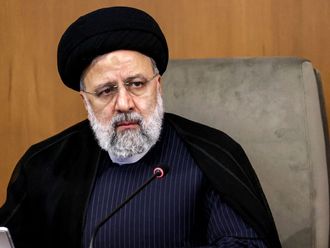
Beirut: The once-dreaded Daesh, is all but finished in both Syria and Iraq. They have already been expelled from important cities Iraqi cities like Mosul, Tikrit, and Fallujah. By end of this month, their last remaining cells in Syria will also be eradicated by the Turks in Idlib, by the Kurds in Raqqa, and by the Syrian Army in Deir Al Zor and Al Mayadeen along the Euphrates River.
Just two years ago, Daesh boasted of 50,000 vicious fighters, controlling an area as large as Great Britain and a population of approximately six million unfortunate souls.
They had all the trappings of statehood; a so-called caliph, a fearless army, a national flag, their own anthem, an intelligence service, a functioning bureaucracy, and a treasury oozing with oil money stolen from the wells of Iraq and Syria.
Soon, Syria and Iraq will be declared Daesh-free, leaving observers to wonder: who are the winners and losers?
Winners:
Syrian regime: Many expected a speedy collapse back in 2011, until the international community’s priorities changed after the rise of Daesh in 2014. The Syrian regime tried marketing itself as an ally in the war on terror, an offer that was rejected flatly by the US, but adopted and promoted by Russia and Iran. They stepped financially and militarily, to make sure that their Syrian allies were kept firmly in place, arguing that if Al Assad left, then Daesh would take over Syria. With time that started to sink in within some international circles, who remained committed to their anti-Al Assad stance but were no longer willing to engage in his unseat, seeing Daesh as a far higher priority.
Iran: More than any other regional heavyweight, Tehran benefited tremendously from Daesh. It used the Daesh threat to justify blatant intervention in the Syrian conflict, striking at everybody on the battlefield and accusing them of either being members of Daesh or supporters
Hezbollah: Daesh gave Hezbollah a reason to survive in the complex world of Middle East politics. A promise to liberate Lebanon’s Israeli-occupied Shebaa Farms became largely irrelevant in the midst of the Arab Spring in 2011. Hezbollah needed a new enemy to fight—a new reason to justify its arms and existence, and found it in Daesh, which creeped into some Lebanese villages. It also fought deep into Syrian territory against rebel groups under the guise of fighting Daesh.
Recep Tayyip Erdogan: The Turkish president—one of Al Assad’s staunchest opponents— was awarded a slice of the Syrian pie in a joint-agreement with Russia and Iran.
Now, Turkey has been given free range to fight Islamist militants in the northwestern Syrian city of Idlib, near the Turkish border—in the process he will work to counter a Syrian Kurdish federalist project which remains a top threat to Turkey with its own sisable Kurdish population.
Syrian Kurds: They managed to convince Washington that they are the most effective partners in the war on terror with their successful operations against Daesh in Kobani and Manbij. The Kurds were kept on the US payroll when all former CIA-funded Syrian rebel groups were crossed off. Earlier this summer, they got an exclusive US green light to liberate Raqqa. In return, the SDF has been rewarded by being granted sweeping autonomy throughout oil-rich territories east of the Euphrates River—a concession that seemingly, has been signed off by Moscow as well.
Losers:
Syrian opposition: A broad coalition of various anti-Al Assad groups have been infuriated by the rise of Daesh. When touring world capitals in 2011-2012, they insisted that the Syrian uprising was a peaceful, civil, and moderate movement.
Many wrote off Daesh as a creation of Iranian intelligence, and doubted that Abu Bakr Al Baghdadi existed. As a result, the Free Syrian Army—initially the most effective rebel group on the Syrian battlefield—has been dwarfed and virtually exterminated in most parts of the country.
Qatar: The tiny oil-rich nation invested heavily in the rapid expansion of Daesh-rule, positioning itself as the only regional player able to settle disputes with the militants. As the war on terror crystalised, most regional players blamed Qatar for the spread of Islamist fundamentalism singling out the Doha-based Al Jazeera TV as an effective propaganda tool. Over time Qatar was squeezed out of the international coalition fighting Daesh.
The Muslim Brotherhood: Although its interpretation of Islamic rule is starkly different of Daesh’s brutal vision–the Muslim Brotherhood has been a big loser mainly because of a guilt-by-association mind-set. Brotherhood officials disavowed Daesh but still championed their idea of an Islamic state. The Brotherhood’s concept of political Islam lost much of its appeal because the reaction against Daesh, regionally and internationally, was strong and resolute.










